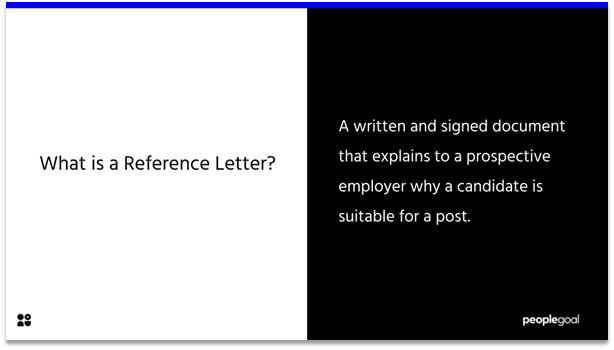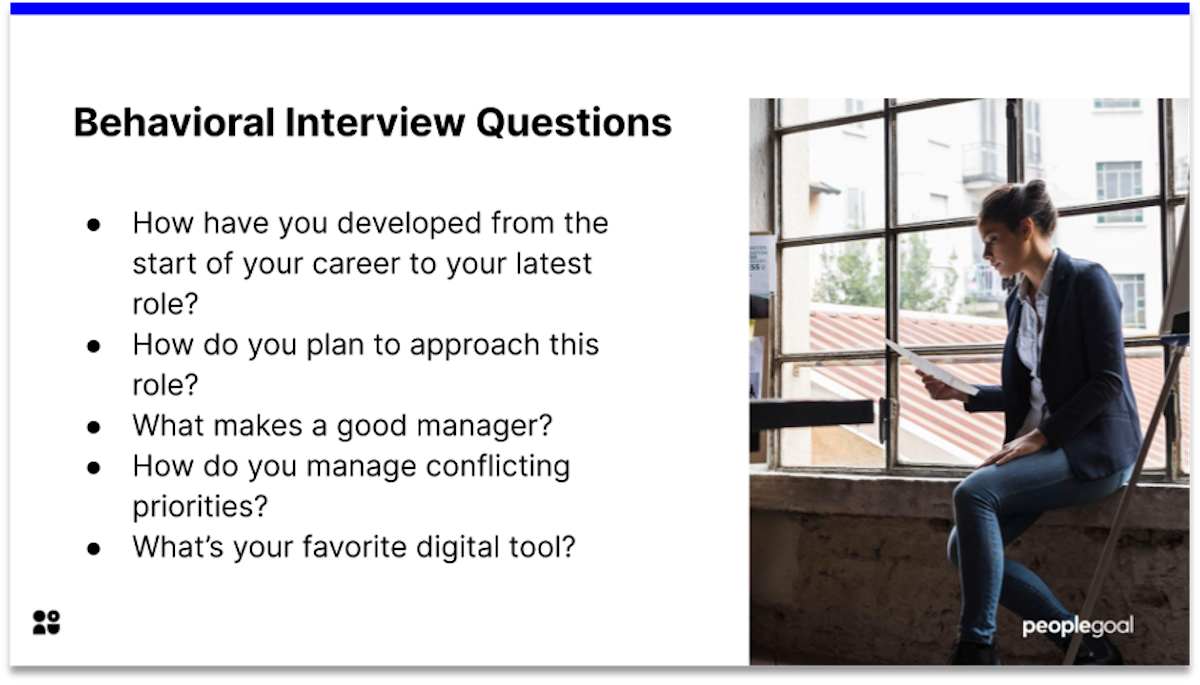What is an exit interview?
An exit interview is a survey and in most cases is based on exit interview questions. A survey which is given to employees who are leaving the company. This is usually given to an employee in a workplace context, but they can extend to students, academia, associations and clubs.
An organization should know the information which they wish to garner from exit interviews to improve and adapt current or persisting frailties at the organization. It also helps the organization to recognize processes and areas which are working well and should not be altered. Perhaps one of the most important benefits of a successful exit interview is the reduction in employee turnover. With continuous improvement around areas which staff raise concerns, comes a downward trend in employee turnover. Other key benefits include:
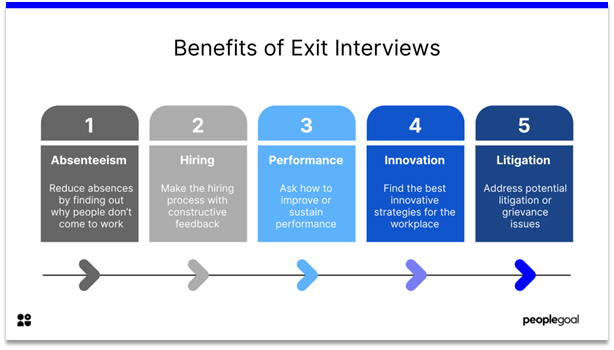
- Reducing Absenteeism
When conducting exit interviews, you should certainly ask what the main facotrs contributing to the individuals absentiesm were. This will allow you to ascertain what aspects of your organisation may be influencing people to not come into work. This could be from a poor environment, to boring work. Nonetheless, if you colate the answers you collect, you may find a trend. Each issue should be analysed and further rectified where possible.
- Efficient Hiring Process
Effective exit interviews are a great opportunity to find out how the employee felt about the hiring process in an honest setting. Due to the fact that the employee is leaving, they are more likely to be honest.This gives you an opportunity to obtain constructive feedback on the hiring process, and how you can change it to reduce turnover in the future. This may be in the form of picking the right individuals, or developing your onboarding process.
- Sustaining and/or Improving Performance
Employee exit interviews also allow you to gather valuable information on how you can sustain/improve performance. After all, your workers are the frontline people, who are affected by any performance strategies or lack there of that you have/do not have in place. You should utilise your exit interviews to seek out factors negatively influencing productivity within the workplace. Once you have found these weakenesses, you can work towards developing a better performance strategy.
- Sustaining and/or Improving Innovation
The same goes for improving innovation. The more information you can gather about current innovative strategies in place and new ideas that could improve innovation the better. For instance creating a fun/progressive workspace such as adding slides to the office can drive innovation within teams as it’s an out of the box environment.
- Addressing Potential Litigation or Grievance Issues
All outgoing employees should be asked questions focused on potential litigation and/or grievance issues as to avoid unsuspected lawsuits. This is a way for companies to protect their physical and intellectual property. This will usually only be the case if an employee leaves on bad terms. However, it is always beneficial to ask nonetheless. If any issues can be addressed internally, make sure you take action on these.
32 Exit Interview Questions That You Should Ask
It is important for each organization to customize its own exit interview in order to maintain the highest levels of survey validity and reliability.
Thus, adopt and adapt these questions where you feel necessary…
- Why did you start to look for another job?
- What are your reasons for leaving?
- What led you to accept a new position somewhere else?
- What is in your new position which influenced your decision to leave?
- In your opinion were you well enough equipped to do your job well?
- What in particular, could we have done better?
- What could we have done to keep you at the company?
- Would you ever consider returning to this company?
- Would you ever consider returning to this company? In what function or area
- What would need to change in order for you to remain here ?
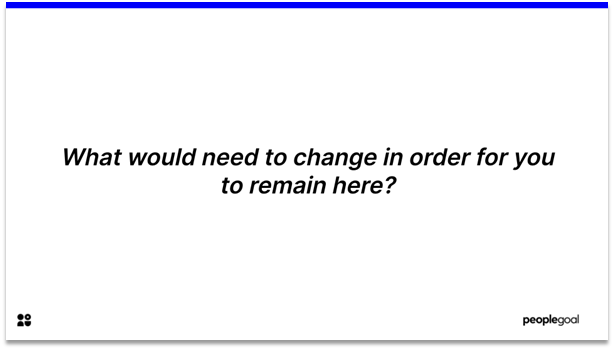
- How would you describe your relationship with your manager?
- Did you receive constructive feedback to help improve your performance? Was this feedback effective?
- What things could your manager have done better?
- What things could our senior leaders have done better?
- Did you feel your achievements were recognised whilst at this company?
- Please briefly describe the company culture here.
- Were you managed in a satisfactory manner?
- Did you feel the company offered a space to voice your concerns?
- Did you feel that you were valued by the company?
- Did you feel that your job role and duties changed over the course of your employment? If So, How?
- Do you feel you had someone you could share your concerns with at the company?

- What was the best part of your job?
- What was the part of the job you least liked?
- Do you feel your goals and objectives clear?
- Was the feedback you received adequate?
- Do you feel the feedback you received helped you to improve?
- Would you recommend our company to a friend or family member?
- Do you think your job has changed since you were hired?
- Are there any individuals at the company you feel deserve more recognition, or made your working life more enjoyable?
- Do you feel we can improve our training and development? If so, how?
- Do you feel you and your colleagues got on well?
- Did you feel engaged while at our company?

How to Set up an Exit Interview Process
First of all you should start by deciding upon your interview format. Using a questionnaire may be quick, easy and allow you to avoid uncomfortable conversations, however you are far less likely to obtain honest and valuable information as you would if you conduct face to face exit interviews. Furthermore, conducting exit interviews face to face gives you the opportunity to end things on a personal and positive note.
The next step is to decide upon your interviewer. If possible, this should be someone other than the employees manager, as the power dynamic here may allow for bias feedback in so that the employee feels comfortable asking for a good reference. Therefore many people use their HR team to conduct exit interviews or outsiders who are not part of the organisation.
Finally you need to decide upon the questions you are going to ask, and those that are not necessary to ask. Although you don’t want to make the exit interview feel scripted, its useful to get some topics prepared, and areas you wish to cover, both positive and negative, as well as being role based. No matter what, you must ensure confidentiality.
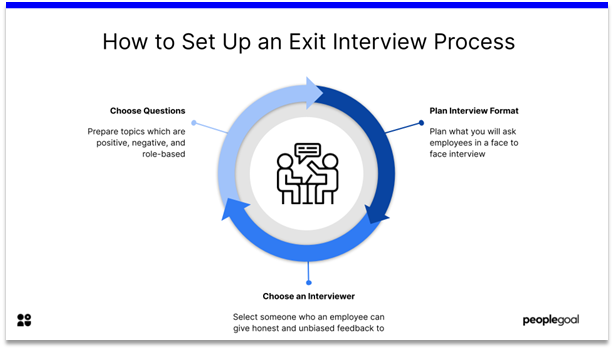
Ready to 3x Your Teams' Performance?
Use the best performance management software to align goals, track progress, and boost employee engagement.



